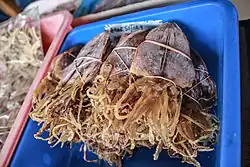するめ
Japanese
| Alternative spelling |
|---|
| 鯣 |
Etymology
Unknown.
The oldest sense when first attested in the Wamyō Ruijushō of 934 is squid, apparently in reference to the Japanese flying squid commonly used after being dried.[1] By 1334, the sense shifted to refer to the dried foodstuff.[1]
The "dried squid" sense is now the most common, while the "type of squid" sense is often expressed using the term 鯣烏賊 (surume ika) instead.
Noun
するめ or スルメ • (surume) ←するめ (surume)?
- [from 1334] dried squid or dried cuttlefish used for food, vaguely similar to jerky
- [from 934] the Japanese flying squid or Todarodes pacificus, commonly used after being dried
- Synonym: 鯣烏賊 (surume ika)
Synonyms
- あたりめ (atarime)
Derived terms
- 鯣烏賊 (surume ika)
See also
- いか (ika, “squid, cuttlefish”)
References
- “するめ”, in 日本国語大辞典 (Nihon Kokugo Daijiten, “Nihon Kokugo Daijiten”) (in Japanese), concise edition, Tōkyō: Shogakukan, 2000
- Matsumura, Akira, editor (2006), 大辞林 [Daijirin] (in Japanese), Third edition, Tōkyō: Sanseidō, →ISBN
This article is issued from Wiktionary. The text is licensed under Creative Commons - Attribution - Sharealike. Additional terms may apply for the media files.

